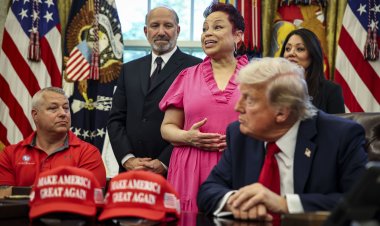Trump Requests Supreme Court Approval to Implement Ban on Transgender Soldiers
He is seeking permission from the high court to implement the ban during the ongoing lawsuits disputing it in the lower courts.

Two federal judges have blocked the administration from discharging any transgender service members, concluding that Trump's policy change is likely unconstitutional due to its discriminatory motivation and lack of legitimate military justification. Currently, only one of these rulings, from U.S. District Judge Benjamin Settle in Tacoma, Washington, is operational.
Solicitor General John Sauer submitted an emergency appeal to the Supreme Court on Thursday, contending that Judge Settle exceeded his authority. The ruling “cannot be squared with the substantial deference” that courts should afford to the Department of Defense’s “professional military judgments” regarding the assertion that transgender service members could jeopardize military readiness, Sauer stated.
He further asserted, “The Constitution does not authorize courts to second-guess the approach to gender transition adopted by the 2025 policy.”
In 2019, the Supreme Court narrowly ruled, in a 5-4 decision, that the initial Trump administration could implement a more limited ban excluding transgender individuals who had transitioned or were unwilling to serve “in their biological sex.”
President Joe Biden later reversed this ban, permitting most transgender individuals to serve openly. However, shortly after taking office, Trump rescinded Biden’s policy and enacted an even stricter ban via executive order.
Justice Elena Kagan, responsible for emergency appeals from Washington state, has given those challenging the ban until May 1 to respond to the administration’s appeal.
Settle was appointed by George W. Bush, while U.S. District Judge Ana Reyes of Washington, D.C., who also blocked the ban, was appointed by Biden. Both judges criticized the Trump administration for misrepresenting data to support the ban while disregarding the recent successes of transgender service members in meeting military standards.
While both judges acknowledged the extensive authority military leaders have in defining standards for readiness, lethality, and unit cohesion, they underscored that the Pentagon must adhere to constitutional limits, which they found the Trump policy had violated.
At present, only Settle’s ruling is effective, as the D.C. Circuit Court of Appeals has temporarily stayed Judge Reyes’ ruling while further review is conducted.
Sauer is requesting that the Supreme Court suspend Settle’s ruling, which would enable the ban to take effect during the ongoing lower court litigation.
This request marks the latest in a series of emergency appeals the Trump administration has filed with the Supreme Court on an expedited basis. Recently, the administration has sought swift intervention from the high court regarding several pressing issues, including cases related to deportations to El Salvador, Trump’s attempt to dismiss board members of independent federal agencies, and efforts to lift nationwide injunctions halting his executive order on birthright citizenship.
Sauer's filing in the transgender service members case also challenges the nationwide scope of the injunction put in place by Settle. Should the Supreme Court choose to maintain any portion of the injunction, the Trump administration argues it should only apply to the eight service members who brought the case.
Allen M Lee for TROIB News












